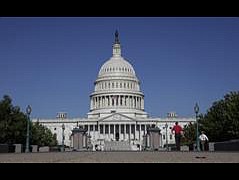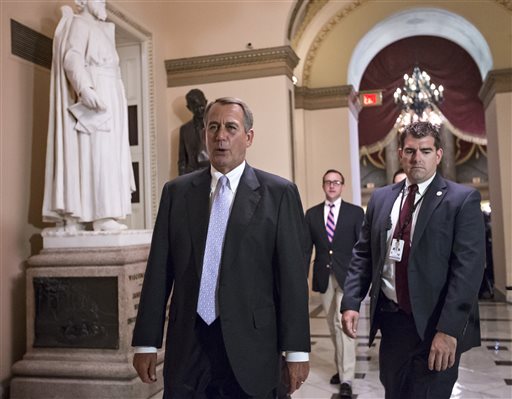Julie Watters was driving down a narrow road in England listening to the radio Friday when the impact of the U.S. government's possible shutdown on Tuesday really hit her.
Service members might not get their paychecks on time. Her active-duty military husband might not get paid.
But they still have to pay the bills.
Ooltewah-born and raised, Watters and her husband, Staff Sgt. Barry Watters, have lived in England since May while he's stationed at Royal Air Force Base Lakenheath. If the federal government can't agree on a temporary spending bill by Tuesday, Watters -- and as many as one-third of all federal workers -- will be in a bind.
"After the cost of moving here we basically live paycheck to paycheck because we depleted our savings and had to hit the credit cards," she said in an email. "Thinking of his pay, our only source of income, being delayed terrifies me as we are still relative newcomers to this country."
About 3.4 million active-duty military personnel would still report to work Tuesday even in a shutdown, but wouldn't get paychecks for the time until the government was once again up and running.
A shutdown would close most national parks and furlough as many as 800,000 federal civilian employees, causing delays and snags in everything from processing federal mortgage and student loans to issuing new passports, gun permits and Social Security benefits.
If a budget agreement is not reached by midnight Monday, the Chickamauga & Chattanooga National Military Park would be forced to furlough 26 of 30 park employees and close. Point Park on Lookout Mountain and the Chickamauga battlefield near Fort Oglethorpe would shut down just days before a signature four-day symposium to commemorate the 150th anniversary of the Civil War.
Essential federal services will continue and the biggest federal agencies in the region -- the Tennessee Valley Authority and the U.S. Postal Service -- would not be affected because they are largely supported by rate-payers. But closings on government-backed mortgages could be delayed and signing up for new veterans and Social Security benefits also could be temporarily thwarted.
Todd Roeder, chief ranger at Chickamauga, said the military park has been planning for more than a year for its Civil War symposium, which is scheduled to start Oct. 9.
"We had planned for programs to include 1,700 fifth- and eighth-grade students attending educational programs on October 9 and 10, and that relies on park staff who wouldn't be able to be there," he said. "Conducting battlefield tours was part of that, and they wouldn't be able to happen. We planned to provide exhibits that would not be provided. It's kind of huge."
If the shutdown extended throughout October, which is considered unlikely, Point Park alone would lose about $24,000 in admission fees, Roeder said. The visitor center's gift shops would lose about $44,000 in sales.
Restrooms, picnic areas and secondary roads would be shut off, but commuter traffic would be allowed through LaFayette Road, Reeds Bridge Road and McClellan Gap Road, he added. In Alabama, Russell Cave National Monument and Little River Canyon National Preserve would close.
"Communities depend on national park units for people who are coming out to look at the natural beauty of the area," said Gail Bishop, Little River Canyon superintendent. "They spend their funds here. But we're doing the best we can."
All but 47 of the 326 employees at the Great Smoky Mountains National Park would be furloughed without pay, park spokeswoman Dana Soehn said. The park usually sees around 1 million visitors in October, she added.
The last time the government shut down was in December 1995, and that lasted for three weeks.
"No one is saying it's going to happen; we're just making plans in case it does," Roeder said.
Furloughs also are likely at a variety of federal facilities in Tennessee, including the 4,500-employee Oak Ridge National Laboratory. U.S. Sen. Lamar Alexander, R-Tenn., who last week urged his Republican colleagues in the House not to shut down the government, also warned of delays for the nearly 2 million Americans who fly each day because of fewer Transportation Security Administration agents.
A government shutdown would quickly reverberate into the private economy. Since 90 percent of mortgages are now federally backed, a federal government shutdown -- especially a prolonged one -- could cause problems in the real estate market.
"We're hoping there is an agreement because the last thing we need is more delay and problems for our industry and any more uncertainty for consumers," said Ben Phillips, manager of Home Town Lenders in Chattanooga.
Most FHA and VA mortgage approvals are more automated than when the federal government last shut down, but processing of rural development and other USDA loans that require staff approval is likely to be delayed.
"We may also have problems with reverse mortgages that borrow from the Treasury," said Don Oakes, president of Mortgage South in Chattanooga.
Oakes said he has "a bunch" of loan closings on Tuesday and Wednesday, "but I'm hopeful those will go ahead since they have already been approved."
"If a government shutdown were to drag on a couple of weeks or so, this would cause a cascade of problems because other sales might not close until sales dependent upon the federal government operating could be completed," he said.
Business Editor Dave Flessner contributed to this report.
Contact Shelly Bradbury at sbradbury@timesfree press.com or at 757-6525.

